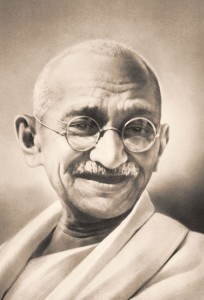M.K. Gandhi was a Middle Way thinker in very striking practical respects. I count him as such not because of his obviously metaphysical beliefs about God, Truth, and the ultimate unity of religions, nor because of his commitment to Pacifism, but because of his courage and innovation when it came to dealing practically with conflict and providing us with tools for non-violent political change. Gandhi’s key insight was that the whole concept of any enemy is a projection of narrowed, dogmatic representations of the world. Our desires may conflict with others’ desires, but that conflict needs to be resolved by integration, not by a victory that eliminates the ‘enemy’. The conflict we may have with ‘enemies’ reflects a conflict within ourselves and within that person, which is not resolved by ‘winning’ the conflict.
Instead, in a case of conflict like that between exploited Indians and the ruling British of imperial India, the resolution of the conflict comes from making opponents recognise the conditions they are ignoring in their unnecessarily narrowed view of the world. They can be led into this by being led to see the humanity of those they are oppressing, and the similarity, rather than just the difference, between their concerns and those of the group or individuals they have previously seen so rigidly. If they cannot be positively persuaded, they need to be shocked into an act of imagination.
The recent death of Richard Attenborough prompted me to re-view the great biopic of Gandhi that he directed, and I highly recommend that film to get an impression of the man (selective though it inevitably is). The following scene from the film depicts the disciplined practice of non-violent protest that Gandhi inspired and organised, though Gandhi himself does not appear in this clip (he had just been imprisoned). The march on the salt works was inspired by the injustice of a British state monopoly on the making of salt, so in effect the salt works symbolised British imperial rule.
At one time I used to think of this scene as masochistic, but now I no longer think of it in this way. There seems to be no sign that the protesters lacked confidence or had any sort of craving to be hurt. Masochism reflects a conflict and repression within, but I see no sign of that in these men (though of course it is a reconstruction, and who knows what motivated the original men). Rather their willingness to incur injury to themselves for their cause could be seen as the result of their commitment to integration: not so much a self-sacrifice as a recognition that voluntary physical injury to oneself is in the end less important than the integration they were trying to bring about.
This, at least, is how I now read the practical insights that Gandhi reached, in which I see a powerful example of the Middle Way in action. In practice, in his political campaigning at its best, Gandhi seems to have neither stuck dogmatically to an interpretation of his beliefs that would cause immediate conflict, nor gone to the self-sacrificial opposite extreme of giving up the cause that he identified with and understood the justice of. It is in his private life, revealed particularly in his Autobiography ‘My experiments with truth’, that I find a much more dogmatic Gandhi: one whose absolute beliefs led him to repress his own passions and to have an inconsistent response to his sexuality.
Gandhi called his technique Satyagraha, ‘truth grasp’. At times he seems to stubbornly assert that he has a grasp of truth of a metaphysical kind, but at other times I can read Gandhi’s relationship with ‘truth’ as something he found profoundly meaningful and interpreted with humility, a truth on the edge. Though he was an imperfect human being like the rest of us, he is also a thinker who forged his understanding of the Middle Way in the heat of action.
 our ongoing podcast series in March 2014.
our ongoing podcast series in March 2014.

